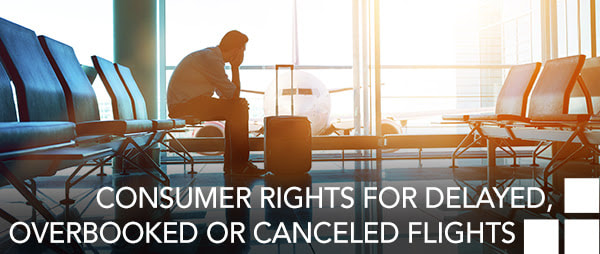|
Many travelers have had to cope with at least one of these situations: their flight is delayed, overbooked or canceled. Of course, our clients should know that we’re always watching out for them, assisting them to get on another flight or booking a hotel room if necessary. But it’s also important for travelers to know what rights they have – and don’t have – in these cases.
The law does not require airlines to compensate passengers if a domestic flight is delayed or canceled, according to the U.S. Department of Transportation. However, each airline has its own policy regarding what, if anything, it will do for customers. For example, some carriers may offer compensation in the form of meal or hotel vouchers. So it’s always a good idea to ask. In the case of overbooking, federal law comes into play. Before bumping anyone off a flight involuntarily, airlines are required to ask for volunteers to give up their seats in exchange for compensation. If there aren’t enough passengers willing to do so, the airline may bump people based on criteria such as check-in time, fare or frequent-flier status. Passengers whose arrival at their destination is delayed by one to two hours (or one to four hours for international flights) must receive compensation of 200 percent of the one-way fare, up to $675. For a delay of more than two hours, (or four hours for international flights) passengers are entitled to 400 percent of the one-way fare, up to $1,350. In order to get volunteers, airlines are free to offer more money than required. There are exceptions to the rules. Airlines are not required to issue compensation if a passenger doesn’t fully comply with ticketing and check-in procedures, if the flight is unable to accommodate a passenger because an aircraft with fewer seats is substituted due to operational or safety reasons, or if an aircraft with 60 or fewer seats is unable to accommodate the passenger due to safety reasons. And no compensation is required if the arrival delay is less than an hour. Passengers who find themselves stuck on the tarmac for an extended period waiting for takeoff should know that they have rights under U.S. law, too. Airlines operating aircraft with 30 or more seats cannot allow them to remain on the tarmac for more than three hours on domestic flights or more than four hours on international flights without giving passengers an opportunity to leave the plane. Exceptions are allowed for safety, security and air-traffic control reasons. In addition, airlines must provide adequate food and water, ensure that lavatories are working and notify passengers regarding the status of the delay. Share the knowledge |
AuthorSharing my travel experiences and insights Archives
July 2024
|
|
Click here to schedule a free consultation about your next trip! (408) 718-4872 [email protected] |
Affiliate of KHM Travel Group
California Seller of Travel Registration # 2089491-50. Registration as a seller of travel in California does not constitute the state's approval. Agent is not a participant in the Travel Consumer Restitution Fund. Florida Seller of Travel Registration # ST37113. Hawaii Seller of Travel License # TAR 7231. Washington Seller of Travel UBI # 602 775122.
California Seller of Travel Registration # 2089491-50. Registration as a seller of travel in California does not constitute the state's approval. Agent is not a participant in the Travel Consumer Restitution Fund. Florida Seller of Travel Registration # ST37113. Hawaii Seller of Travel License # TAR 7231. Washington Seller of Travel UBI # 602 775122.
Managed by Voyager Websites


 RSS Feed
RSS Feed




